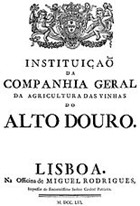Port Wine – A long history of Monopolies

The Producer-Bottler is distinguished from the négociants (or Companies) by the fact that he is only authorized to commercialize wines with grapes produced in the Quintas themselves. Despite being at the origin of the process, the producer was, until 1986, excluded from the commercialization of Port Wine.
Port Wine – A long history of Monopolies
For a long time, Port Wine was a company business, whose commercialization was reserved to several monopolies, leaving the winegrower aside.
Over the centuries, there have been several changes in legislation but only recently has the producer been empowered and allowed to reap the benefits of his labor.
The English Monopoly
It is public knowledge that Port Wine owes its success to British intervention. In fact, given the important demand from the United Kingdom and the close relations between the two countries, favorable conditions were created for the development of the commercialization of Port Wine by the English, namely through favorable commercial agreements.
Thus, for dozens of years, the marketing of Port Wine was almost exclusively the responsibility of the English, who thus contributed to its success.
The Pombaline monopoly

In 1756, the Marquis of Pombal decides to implement state control over Port Wine, thus creating the Companhia Geral da Agricultura das Vinhas do Alto Douro (later known as Real Companhia or Companhia Velha).
Thus was born a true monopoly of the Crown over the commercialization of Port Wine to the United Kingdom and Brazil but also over the brandy business.
Over the centuries, the Company would come to be one of Portugal’s greatest sources of income.
Phylloxera and the change in the Douro landscape
In the 1860s, the Douro was devastated by phylloxera, a disease that destroyed much of the Douro wine-growing landscape. This period marks a double change in the ownership of the Quintas.
On the one hand, it strengthened the monopolistic character as many owners were forced to abandon their land to large capitalist financial structures. On the other hand, the abandonment of the land by the landlords allowed the land workers to access the property.
The monopoly of Vila Nova de Gaia
The year 1926 excluded a little more producers from commercialization. In order to fight against falsifications and to effectively control the Port Wine, the only warehouse in Vila Nova de Gaia was created by decree. The law stipulated that Port wine merchants had to locate their warehouses in Vila Nova de Gaia.
Such measures were obviously a huge hindrance to small winegrowers who could not afford to buy warehouses in Gaia and manage all the associated logistics.
The Fight of the Small Producers
Quinta do Infantado – Forerunner in the Struggle
In 1979, Luís Roseira, exploiting the loopholes in the legislation, established Quinta do Infantado as a producer-bottler and was then limited to commercializing his Port Wine in the internal market.
Besides the limitation to export, to be able to access that status, the producer also had the great limitation of having the obligation of having all the process (vinification, bottling and expedition) to be done in the Quinta.
Thus we witnessed the birth of the first Vintage bottled in the Douro: Quinta do Infantado Vintage 1978!
The European Union and the creation of AVEPOD

Over the years, Luis Roseira mobilized a growing number of producers who joined the fight until the creation in 1986 of AVEPOD: Associação do Viticultores Engarrafadores dos Vinhos do Porto e Douro (Association of Port and Douro Wine Bottlers) which still today aims to defend the interests of the Douro Small Producers.
Portugal’s accession to the European Union was the producers’ great triumph. Taking advantage of one of the Community’s great principles of free competition, the legislation was finally modified on May 7, 1986, thus authorizing “the export of bottled Port wine by producers who are subject to all the rules in force, particularly those relating to quality control, existence and capacity.
Limitations and difficulties of the Producer-Bottler
Despite the great victory obtained in 1986, bottler-producers are still facing today a growing number of challenges. The first challenge is the prohibition to purchase grapes from other growers, thus limiting the ability to market to one’s own production and the variations of the vintage.
Another major challenge is the imposing presence in the market of monopolies installed centuries ago and with overwhelming financial power. In fact, the top 5 groups represent more than 80% of the total commercialization. Therefore, economies of scale have a huge impact on the final cost.
Finally, the big problem in the Douro is the price of the grapes. Because of the great weight of the merchants, the selling price of the grapes is outrageously low compared to the production costs. In practice, buying the grapes is cheaper than producing them.
Advantages and Prospects
However, it is not all difficulties. The obligation to produce one’s own grapes has as a consequence an affirmation of the identity of the producers and an increasing differentiated quality. Yes, these are distinctive wines with their own identity!
The possibility for producers to market their own wines has triggered the emergence of “new” categories of Port wines of exceptional quality, including categories of aged White Ports and with indication of age or even the access to the consumer of centenary wines!
The appearance of more and more producers-bottlers has also balanced the bargaining power in the purchase of grapes but also, and above all, in the purchase of old wines, giving more and more bargaining power to small producers.
From the point of view of the consumer and appreciator, the access to distinctive and superior quality wines can only be seen as a great advantage!
